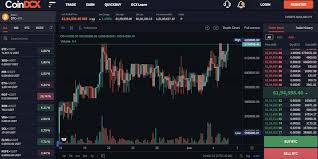
Navigating the World of Crypto Trading Platforms
The explosive growth of cryptocurrency has created a massive demand for secure, reliable, and user-friendly crypto trading platforms. From Bitcoin to altcoins like Ethereum, Solana, and Litecoin, digital asset trading is no longer limited to tech-savvy investors. Today, anyone with internet access can enter the world of crypto with just a few clicks.
But with hundreds of trading platforms available—each offering a unique blend of features, fees, and interfaces—how do you choose the right one? In this article, we break down everything you need to know about crypto trading platforms in 2025, from must-have features to top choices and common pitfalls to avoid.
What Is a Crypto Trading Platform?
A crypto trading platform is an online exchange where users can buy, sell, and trade cryptocurrencies. These platforms act as intermediaries between buyers and sellers, providing a secure environment to perform transactions. Some also offer advanced features like margin trading, staking, futures, and crypto savings accounts.
There are two main types:
-
Centralized Exchanges (CEX): Operated by companies (e.g., Binance, Coinbase) and offer user-friendly services.
-
Decentralized Exchanges (DEX): Peer-to-peer platforms (e.g., Uniswap, PancakeSwap) with no central authority, often appealing to DeFi enthusiasts.
Why Crypto Trading Platforms Matter
Choosing the right crypto trading platform can make or break your trading journey. Here’s why:
✅ Security:
Top platforms use encryption, two-factor authentication (2FA), cold wallets, and compliance measures to protect user funds.
✅ Ease of Use:
Good platforms simplify trading for beginners while providing advanced tools for experts.
✅ Market Access:
They offer access to hundreds (or thousands) of coins and trading pairs, increasing diversification options.
✅ Liquidity:
High liquidity ensures fast transactions and fair pricing, especially for large-volume trades.
Top Features of a Reliable Crypto Trading Platform
🔐 1. Security Infrastructure
-
Two-Factor Authentication (2FA)
-
Cold wallet storage
-
SSL encryption
-
Insurance for user funds (in some cases)
📊 2. Real-Time Analytics and Charting Tools
Advanced charting tools help you make informed decisions based on market trends, trading volume, and technical indicators.
💰 3. Fee Structure
Always consider:
-
Trading fees (maker/taker)
-
Deposit & withdrawal charges
-
Hidden fees in the form of spreads
🌍 4. Supported Coins and Pairs
The broader the crypto selection, the better your opportunities. Platforms like Binance and KuCoin offer over 500+ assets.
📱 5. Mobile App Availability
A responsive, feature-rich mobile app ensures you never miss a trade on the go.
🛠️ 6. Customer Support
24/7 live chat, email support, and comprehensive help centers enhance the user experience.
Best Crypto Trading Platforms in 2025
1. Binance
-
🌟 Best Overall Platform
-
Supports 600+ cryptocurrencies
-
Competitive fees: 0.1%
-
Advanced tools for experienced traders
2. Coinbase
-
🌟 Best for Beginners
-
Extremely user-friendly interface
-
Regulated in multiple countries
-
Limited altcoin access compared to others
3. Kraken
-
🌟 Best for Security
-
Robust security features and regulatory compliance
-
Staking available
-
Slightly complex UI for beginners
4. KuCoin
-
🌟 Best for Altcoin Access
-
Offers trading in less common coins
-
Built-in trading bots
-
Lower liquidity for niche coins
5. eToro
-
🌟 Best for Social Trading
-
CopyTrading feature for beginners
-
Regulated and secure
-
Limited crypto portfolio
How to Choose the Right Crypto Trading Platform
When evaluating platforms, consider the following:
✔️ Regulation and Licensing
Look for platforms registered under financial authorities (e.g., FCA, ASIC, FinCEN).
✔️ User Reviews and Reputation
Check forums like Reddit or Trustpilot for real user experiences.
✔️ Ease of KYC/Verification
Some platforms require strict identity checks, while others are more lenient. Know what you’re signing up for.
✔️ Funding Options
Does the platform accept fiat currency deposits via bank transfer, credit card, or PayPal?
✔️ Trading Features
Look for stop-limit orders, margin trading, futures, and APIs for bots if you’re an advanced trader.
Pros and Cons of Using Crypto Trading Platforms
| Pros | Cons |
|---|---|
| Wide access to global crypto markets | Platform hacks (in rare cases) |
| High liquidity and fast trade execution | Some have complex UIs for beginners |
| Secure fund management and insurance | Fees can vary widely between platforms |
| Convenient tools like mobile apps & charts | Regulatory restrictions in some countries |
Decentralized vs. Centralized Crypto Trading Platforms
Centralized Exchanges (CEX)
-
Easier to use
-
Fiat deposit options
-
Customer support available
Decentralized Exchanges (DEX)
-
Full control of private keys
-
Lower trading fees
-
No KYC (ideal for privacy-focused users)
⚠️ Note: DEXs require you to be tech-savvy and offer no support if you lose access to your wallet.
Tips for Trading Safely on Crypto Platforms
-
Use strong, unique passwords and enable 2FA.
-
Withdraw large holdings to private wallets, not leave them on exchanges.
-
Be cautious of phishing links and fake platforms.
-
Regularly check transaction history for suspicious activity.
Conclusion: Your Gateway to the Crypto Economy
Choosing the best crypto trading platform is the first and most important step in your digital asset journey. Whether you’re a casual investor looking to HODL or an active day trader seeking margin and leverage, there’s a platform tailored to your needs.
As crypto continues to evolve, the platforms themselves will become more secure, intuitive, and powerful. Be sure to stay informed, do your due diligence, and use the insights from this guide to select the right platform to maximize your crypto potential.
FAQs: Crypto Trading Platforms
Q1: Are crypto trading platforms safe to use?
Most top-tier platforms like Binance, Coinbase, and Kraken are highly secure. Look for platforms that offer 2FA, cold storage, and regulatory compliance.
Q2: Do I need to verify my identity to use a platform?
Yes, most centralized platforms require KYC verification. DEX platforms typically do not.
Q3: What’s the difference between spot trading and futures trading?
Spot trading involves buying crypto at current market prices. Futures trading involves contracts to buy/sell at a future date, often with leverage.
Q4: Can I trade crypto using my phone?
Absolutely. Leading platforms offer mobile apps with full functionality for on-the-go trading.
Q5: Are there platforms for beginners?
Yes. Coinbase and eToro are great choices for those new to crypto trading due to their intuitive interfaces and tutorials.





